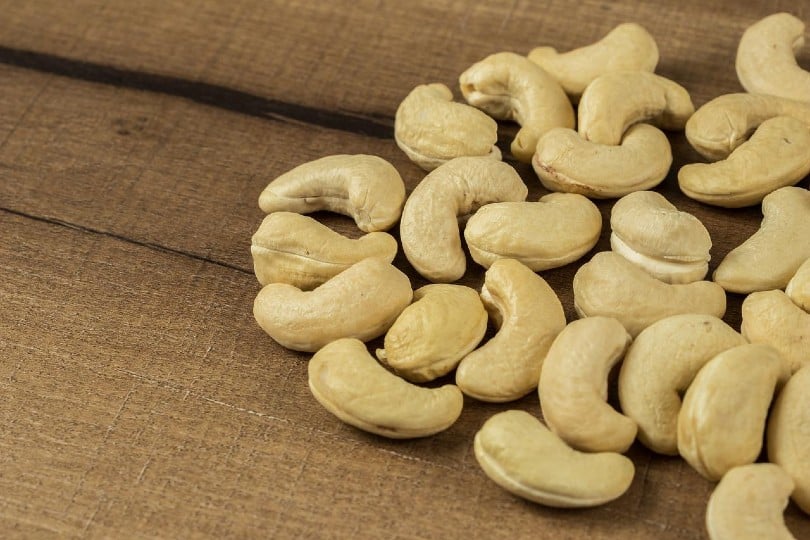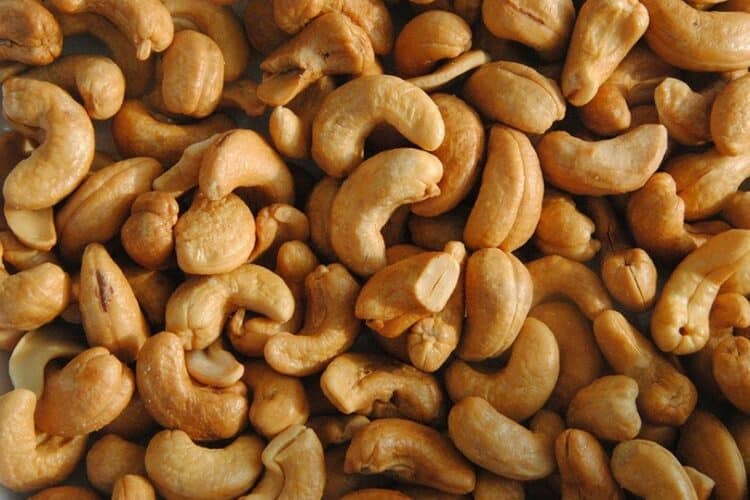There is concern over what types of nuts are safe for dogs to eat due to the potential health issues in dogs that a variety of common nuts we consume may cause them.
Cashew nuts are generally safe for dogs to consume and are not toxic. As a dog owner, you might be considering adding this high-protein snack to your dog as a treat or dietary supplement, or your dog might have consumed some on accident.
Regardless of the situation, cashews rarely have any serious health problems associated with a dog eating them occasionally, but there are certain risks you should be aware of before introducing cashews to your dog’s diet.
Can Dogs Eat Cashews?
If your dog has eaten a cashew nut, there’s no reason to worry as luckily cashews are pretty safe. In fact, cashews are suitable to feed your dog and are rich in fatty acids like oleic and palmitoleic acid which are great for helping prevent heart disease. This nut has a creamy taste that many dogs love, so it can form a healthy treat for your dog when fed in moderation.
Unlike many other nuts (Avoid: pecans, walnuts, hickory, and macadamia nuts), cashews are safe to feed and have no known reports of toxicity in dogs. Furthermore, cashews are high in copper which is a great essential mineral for your dog’s joint and bone health.
Cashew nuts are cholesterol-free and contain low traces of sugar and various minerals and vitamins such as potassium, magnesium, and calcium which can be beneficial for dogs. If you find that your dog takes a liking to cashews, then they can become a great replacement for other treats your dog is being fed.

Feeding Cashews To Dogs – Concerns and Feeding Guideline
If your dog likes cashews, then you can slowly introduce them into your dog’s diet. It is best to choose the natural, raw variety of cashews that have not been salted or contain spices. Roasted cashews are fine to feed to your dog, but the taste and texture of roasted cashews may not appeal to them.
There is a concern that dogs can be allergic to nuts, just like humans. It is important to feed your dog one or two cashews and wait a few hours to see if they start showing any signs of an allergic reaction, which can present itself with the following symptoms:
- Excessive itching
- Swelling
- Bloating
- Skin issues (redness, hives)
- Drooling
- Stomach discomfort
Avoid feeding cashew nuts that are packaged with other nuts due to the issue of toxicity. It is also possible for your dog to be allergic to other nuts but not cashews, so cross-contamination from a variety pack of cashew nuts is possible.
If you decide to feed cashew nuts as a treat to your dog, keep in mind that they are high in calories. If your dog is already overweight or has any current health conditions that limit the amount of fat their body can handle, then cashew nuts will not be the best dietary investment for them. The high-fat content in these nuts can be problematic if they are fed to dogs too often and may increase their risk of becoming obese or developing pancreatitis.
Another concern about feeding whole cashews to dogs is the risk of choking. These are small nuts that can pose a choking hazard, so it is best to grate the nut up into a powder and sprinkle it over your dog’s food rather than giving them the entire nut on its own. Always supervise your dog when giving them small treats so that you can intervene if choking does occur.
A 20-pound dog can consume approximately two to four cashews a day if they show no signs of an allergic reaction. These nuts are high in fat and can be quite filling, so make sure you do not feed them too many at once.

Conclusion
Cashew nuts are not toxic to dogs and can be fed in moderation as a treat. It is best to avoid feeding this nut in large quantities due to its high fat and caloric content. If you feed this nut in moderation and ensure that your dog is fed a healthy and balanced diet, then giving them cashew nuts should not be a problem.
Always consult with a veterinarian before adding any additional foods into your dog’s diet, especially if they are prone to obesity or have a health condition.
Featured Image Credit: Pixabay














